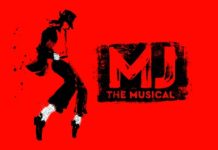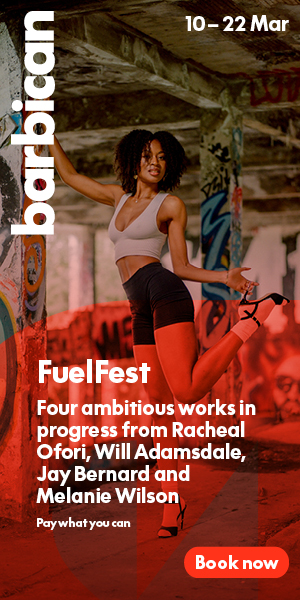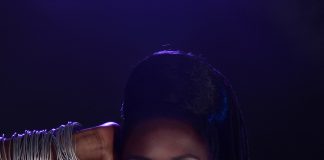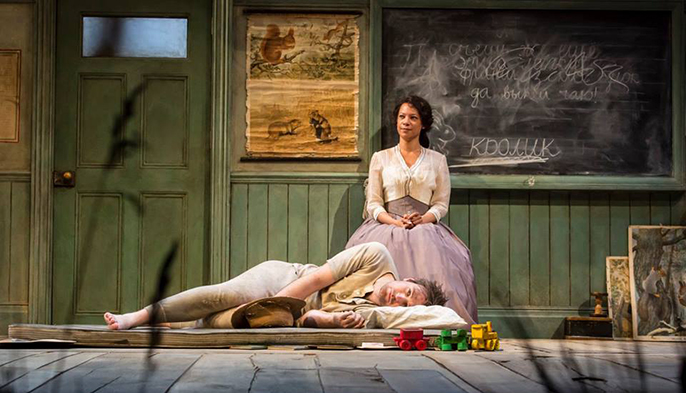
Nina Sosanya – interview
Platonov, National Theatre
In terms of a new age coming, which is one of the things Chekov was dealing with, they had the industrial revolution and we now have the technological revolution.”
Nina Sosanya stars as Anna Petrovna in Platonov (read review) and Ivanov, the first two plays of the Young Chekhov trilogy at the National Theatre. In addition to her performances on stage, the actress is also well known for her work on the small screen, particularly her role as Kate in the BAFTA-winning drama Last Tango in Halifax.
Whilst the prospect of balancing two roles may seem daunting to many actors, from our interview it is evident that Sosanya thoroughly enjoys the challenge.
“They are so directly opposite to each other that it’s an exciting thing to be able to do, particularly when we do the three-show days. What’s interesting is the personal effect it has on oneself when one is playing somebody who is strong, as opposed to somebody who is not so strong. Anna Petrovna, in Platonov, is on the brink of losing everything and she knows it and she’s having to rely on everything that a woman in her position at that time and in that place had at her disposal. So she’s relying on her wit, her education, her attractiveness and her ability to fascinate, to charm. She’s using all those things that she has to try to keep her life together. It puts you in a slightly different frame of mind. It’s an interesting thing to do, particularly when you’ve got other members of the cast playing different roles and you meet them on stage and you have a different relationship with them.”
Before its arrival at the National Theatre it received acclaim at the Chichester Festival Theatre. Sosanya is proud of the production and I am interested to know what she attributes its success to.
“I think it’s just that sometimes all the ingredients are correct. It’s David Hare and it’s Jonathan Kent and it’s the cast that he’s assembled. All of those things made it special. Jonathan directed it with such clarity but it’s very particular, and not something that, during the rehearsal process, was clear to all of us until it all started to come together. Then it became obvious what we had on our hands. It’s very much him and David’s vision and he’s got a cast of people that trusted his taste. We all love it.”
The Young Chekhov trilogy is composed of three of the Russian playwright’s early plays. Set in mid-nineteenth century Russia, Chekhov presents a country declining after the collapse of communism. Despite being written more than a century ago, Sosanya still believes that the stories are as relevant as ever.
“The human stories never seem to change and that’s wonderful and also quite alarming sometimes, particularly [with] theatre that stands the test of time like Chekhov. It doesn’t take much for us to identify with the situation that people are in. Not only women, all sorts of groups of folks are still struggling and that will always be the human condition I suspect. In terms of a new age coming, which is one of the things Chekov was dealing with, they had the industrial revolution and we now have the technological revolution.”
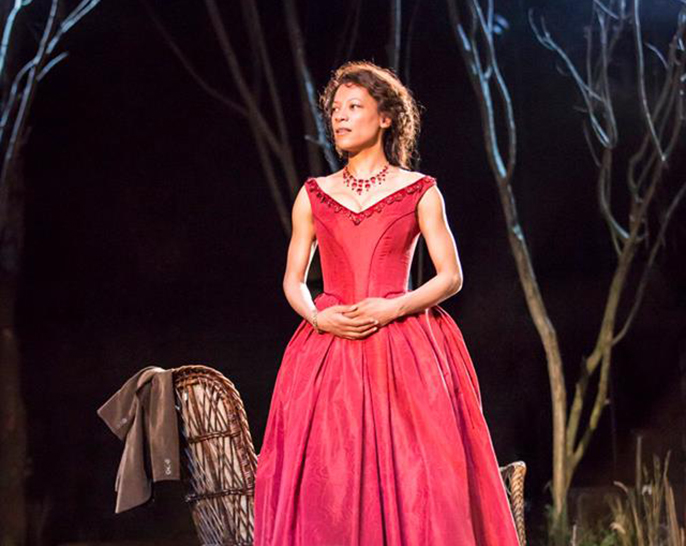
Sosanya also is keen to make it clear that despite the tragic situations that characters are faced with, all three plays in the trilogy are full of comedic moments.
“It’s funny. It seems like it particularly chimes with a British sense of humour. It feels like the darker they are, the funnier they are, and that’s very British.”
She is thoughtful, considering all her answers and it is clear she takes her craft very seriously. She admits that, like many actors, she finds it hard to watch her own work.
It’s common sense that diversity is creative and a lack of it means things are not so creative. I think it’s that simple.”
“Like any actor, you get the feeling that if you could have another go you would do it better. It’s not that I watch myself and go I now know what to do to make that better. It’s more at the end of the day’s filming you’ll get in and suddenly realise how you should have said a line, by which time it’s much too late. Maybe if I had been given the role that I had in Cassanova (Russell T Davies’ three-part drama) now, perhaps I might approach it differently, or even any stage role. There are so many ways of interpreting something that over time you have to pick one and do it. You never feel like you’ve done it perfectly, or even sometimes adequately, but I think that’s quite a normal feeling.”
Whilst talking to Sosanya, her passion for acting is clear. However, as a former athlete and gymnast she had not always envisioned a future as an actor.
“It was not even a dream that I entertained any more than I wonder how people get to the moon, I wonder what it’s like to be queen. It was something that grew out of who I started turning into. When you’re at school, there are certain parts of your personality that lend themselves to things: creativity and performance, of one sort or another.”
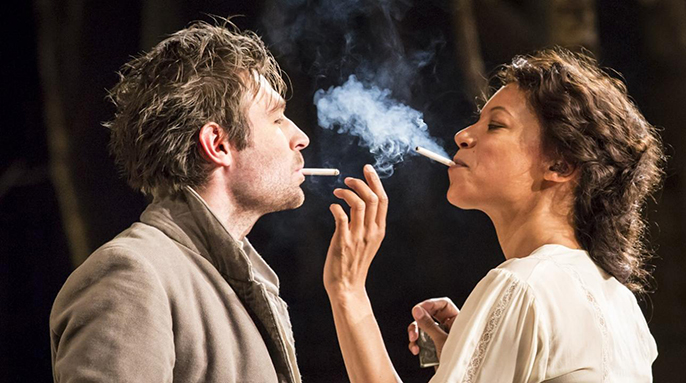
Sosanya has a wealth of experience in both TV and theatre so I ask her if she has a favourite of the two.
“One of the things that is fantastic about theatre is you get to be part of the process, so the actor is there quite near the beginning of the process and you have control over your own performance. With television, mostly as an actor you come in at the end of the process so it’s been written and designed and you turn up and you do your scene. Not only that but your scene gets manipulated, quite rightly, by an editor and you’re not even there so you don’t have control over your performance. That can be incredibly frustrating but it can also be really surprising and great. So the two things are not really comparable.”
Some of her fans online have cited a desire to be able to praise Sosanya’s work but, unlike many of her peers, she is not active on any social media platform. I wonder whether this was a conscious decision or if Sosanya is simply not interested in social media.
“It’s not for me. It’s an incredible and powerful tool and if I engaged with it I would have to tread lightly. I don’t want to be negative but it’s tricky. It’s one of those things I didn’t grow up with so I suppose realistically it’s passed me by slightly. It’s nice to hear that there are people that appreciate you. On the other hand if one is at all sensitive one doesn’t want to find out there are people who don’t, so it’s a double-edged sword. It’s a bit like reading reviews: if you believe the good ones, you need to believe the bad ones so some people don’t read any of them. It’s a tricky one. I don’t have anything against it at all. It’s an incredible phenomenon but no, I don’t engage with it.”
We finish the interview by talking about diversity and representation, a conversation not too unfamiliar for many actors. As Afridiziak Theatre News celebrates African-Caribbean theatre I ask why she thinks that diversity and representation is so important?
“Without diversity you don’t have conflict, without conflict there is no drama, there is no story. Interesting stories come from diversity in all sorts: in colour, in sex, in gender, in age, in ability and disability. It can only be a good thing. My answer could take hours but I think it’s common sense that diversity is creative and a lack of it means things are not so creative. I think it’s that simple.”
Info: Platonov is at the National Theatre until 8 October 2016 | Read our review of Platonov | Book tickets




